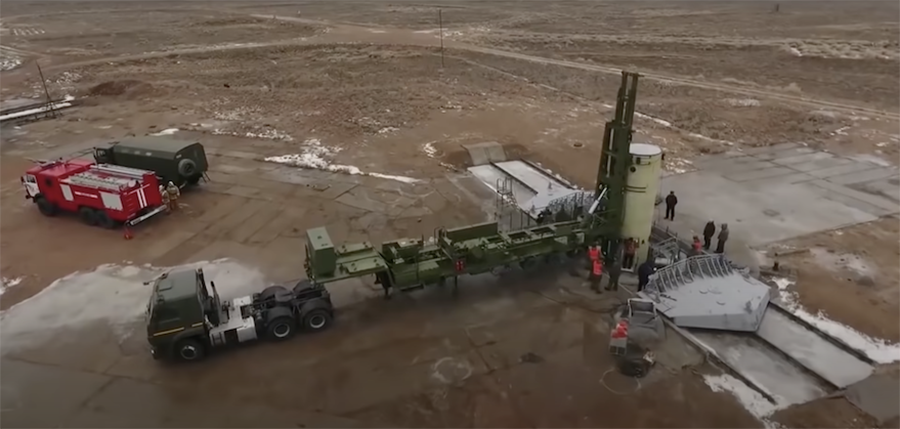"The Arms Control Association’s work is an important resource to legislators and policymakers when contemplating a new policy direction or decision."
Russian ASAT Test Creates Massive Debris
December 2021
By Shannon Bugos
Russia conducted a direct-ascent anti-satellite (ASAT) test on Nov. 15 to destroy one of its own satellites that has been in orbit since 1982, creating a field of at least 1,500 trackable pieces of debris in low orbit and threatening space operations and human spaceflight.
 The destruction of the inactive Russian satellite, known as Cosmos 1408, caused the seven crew members aboard the International Space Station—four Americans, two Russians, and a German—to take shelter multiple times as the station’s orbit intersected with the debris and to seal off modules of the station. The collision occurred about 500 kilometers above the surface and 80 kilometers above the space station’s orbit.
The destruction of the inactive Russian satellite, known as Cosmos 1408, caused the seven crew members aboard the International Space Station—four Americans, two Russians, and a German—to take shelter multiple times as the station’s orbit intersected with the debris and to seal off modules of the station. The collision occurred about 500 kilometers above the surface and 80 kilometers above the space station’s orbit.
“The long-lived debris created by this dangerous and irresponsible test will now threaten satellites and other space objects that are vital to all nations’ security, economic, and scientific interests for decades to come,” U.S. Secretary of State Antony Blinken said in a Nov. 15 statement. NASA said that it would monitor the debris in the coming days and into the future.
State Department spokesperson Ned Price added that “Russia’s dangerous and irresponsible behavior jeopardizes the long-term sustainability of outer space and clearly demonstrates that Russia’s claims of opposing the weaponization of space are disingenuous and hypocritical.”
U.S. Army Gen. James Dickinson, U.S. Space Command commander, also strongly denounced the test, charging that “Russia is developing and deploying capabilities to actively deny access to and use of space by the United States and its allies and partners.”
Defense Department spokesperson John Kirby added that the United States has “been very clear we would like to see norms for space so that it can be used responsibly by all spacefaring nations.” In October, the UN First Committee voted to create a new working group to develop new norms of responsible behavior in space aimed at the prevention of an arms race.
The Russian Foreign Ministry confirmed the test on Nov. 16, but said that the test did not violate the 1967 Outer Space Treaty and that “the debris it produced did not create any threat and does not pose any obstacles or difficulties to the functioning of orbital stations and spacecraft, or to other space activities.” The treaty bans the stationing of weapons of mass destruction and prohibits the testing of any type of weapons in space.
Russian Defense Minister Sergei Shoigu also commented on the test, saying, “We’ve really tested a successful forward-looking system. It hit the old satellite.”
Condemnation of the test quickly rolled in from U.S. allies, members of Congress, and the expert community.
“This destructive anti-satellite missile test by Russia shows a complete disregard for the security, safety, and sustainability of space,” tweeted UK Defense Secretary Ben Wallace on Nov. 15. “The debris resulting from this test will remain in orbit putting satellites and human spaceflight at risk for years to come.”
In Congress, House Armed Services Committee Chairman Adam Smith (D-Wash.) said the test “makes it clear that Moscow is willing to threaten the peaceful use of outer space, further militarize this domain, and disregard any consequences for all nations.”
“We must hold Russia accountable with the support of our allies and partners,” Smith added.
Rep. Mike Rogers (R-Ala.), ranking member on the committee, released a statement describing the Russian test
as “concerning.”
Meanwhile, the Secure World Foundation called for “the United States, Russia, China, and India to declare unilateral moratoriums on further testing of their anti-satellite weapons that could create additional orbital debris and to work with other countries towards solidifying an international ban on destructive ASAT testing.”
“The continued testing or demonstration of anti-satellite capabilities, including the targeting of one own’s space objects, is an unsustainable, irresponsible, and destabilizing activity in space in which no responsible spacefaring state should engage,” the foundation said on Nov. 16.
The Russian test follows activity last year in which Moscow reportedly conducted nondestructive ASAT tests in April and July. During the latter test, a Russian satellite operated in abnormally close proximity to a U.S. satellite before maneuvering away to another Russian satellite, near which it released an object. (See ACT, May and September 2020.)
This is not the first time an ASAT test resulted in thousands of pieces of dangerous debris in space. China shot down one of its weather satellites in 2007, and India destroyed one of its satellites with a ground-launched ballistic missile interceptor in 2019. (See ACT, May 2019; March 2007.)
